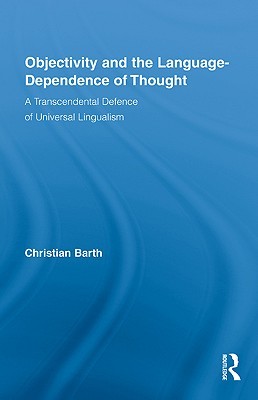
- We will send in 10–14 business days.
- Author: Christian Barth
- Publisher: Routledge
- ISBN-10: 0415882699
- ISBN-13: 9780415882699
- Format: 15.5 x 23.1 x 2.3 cm, hardcover
- Language: English
- SAVE -10% with code: EXTRA
Objectivity and the Language-Dependence of Thought (e-book) (used book) | bookbook.eu
Reviews
Description
Does thought depend on language? Primarily as a consequence of the cognitive turn in empirical disciplines like psychology and ethology, many current empirical researchers and empirically minded philosophers tend to answer this question in the negative. This book rejects this mainstream view and develops a philosophical argument in favor of a universal dependence of language on thought. In doing so, it comprises insights of two primary representatives of 20th century and contemporary philosophy, namely Donald Davidson and Robert Brandom.
Barth offers an introduction to the debate concerning the language-dependence of thought and lays the methodological foundation for the subsequent argument in favor of a universal dependence of thought on language, presenting an account and defense of the transcendental method in reference to the writings of Peter F. Strawson. He then offers a transcendental argument in favor of a universal language-dependence of thought, beginning with a reevaluation of a basic idea for an argument originally presented by Donald Davidson. Later, two main objections to the conclusion of this transcendental argument are addressed and rejected using Robert Brandom's inferentialist and normativist account of thought and language. In the course of doing so, the recent debate on Brandom's work is addressed extensively, and main objections to Brandom's work are presented and answered.
EXTRA 10 % discount with code: EXTRA
The promotion ends in 20d.15:33:21
The discount code is valid when purchasing from 10 €. Discounts do not stack.
- Author: Christian Barth
- Publisher: Routledge
- ISBN-10: 0415882699
- ISBN-13: 9780415882699
- Format: 15.5 x 23.1 x 2.3 cm, hardcover
- Language: English English
Does thought depend on language? Primarily as a consequence of the cognitive turn in empirical disciplines like psychology and ethology, many current empirical researchers and empirically minded philosophers tend to answer this question in the negative. This book rejects this mainstream view and develops a philosophical argument in favor of a universal dependence of language on thought. In doing so, it comprises insights of two primary representatives of 20th century and contemporary philosophy, namely Donald Davidson and Robert Brandom.
Barth offers an introduction to the debate concerning the language-dependence of thought and lays the methodological foundation for the subsequent argument in favor of a universal dependence of thought on language, presenting an account and defense of the transcendental method in reference to the writings of Peter F. Strawson. He then offers a transcendental argument in favor of a universal language-dependence of thought, beginning with a reevaluation of a basic idea for an argument originally presented by Donald Davidson. Later, two main objections to the conclusion of this transcendental argument are addressed and rejected using Robert Brandom's inferentialist and normativist account of thought and language. In the course of doing so, the recent debate on Brandom's work is addressed extensively, and main objections to Brandom's work are presented and answered.


Reviews